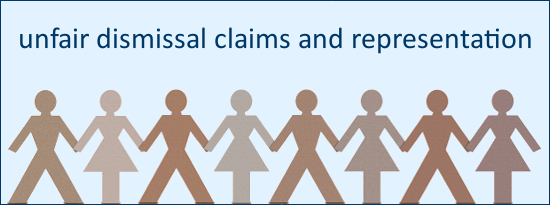
Employment tribunal claims for unfair dismissal
Not everyone in employment is eligible to present a complaint for unfair dismissal. For example, only “employees” are eligible. A person who is self-employed will not be able to claim unfair dismissal.
A dismissal is fair or unfair according to the reason for dismissal, whether the correct dismissal procedure is followed and whether or not the employer has acted reasonably in carrying out the dismissal.
Protection against unfair dismissal
This is contained in the Employment rights Act 1996 (ERA 1996), which provide that the dismissal of a qualifying employee will be unfair unless:
- The employer can show that the reason (or principal reason) for the dismissal was a potentially fair reason. There are 5 potentially fair reasons.
- The tribunal finds that, in all the circumstances (including the employer’s size and administrative resources) the employer acted reasonably in treating that reason as a sufficient reason for dismissal (Section 98(4), ERA 1996). This has been interpreted by the courts and tribunals as meaning that the dismissal must be both “procedurally” and “substantively” fair.
The Acas Code applies to dismissals for misconduct or poor performance, and must be taken into account by tribunals in deciding whether an employer has acted reasonably in relation to the following a fair procedure and giving fair warnings prior to dismissal.
Generally, employees must have completed a qualifying period of service before they have the right not to be unfairly dismissed. The qualifying period is 2 years, or 1 year if employment started before 6 April 2012.
Dismissal for certain reasons is deemed automatically unfair and, in most such cases, employees do not need a qualifying period of employment.
If an employment tribunal finds that the dismissal is unfair, it can order the employer to re-engage or reinstate the employee or (as is more likely in practice) pay the employee compensation.
Who can claim unfair dismissal?
The right to bring a claim for unfair dismissal is available only to an employee who has been dismissed and who, in most cases, has the requisite 2 years’ qualifying period of service (or 1 year if they were employed before 6 April 2012). The qualifying period does not apply in most cases where the dismissal is for an automatically unfair reason.
The work must also have been done in Great Britain or must have a sufficient connection to Great Britain to bring the employee within the territorial scope of the ERA 1996.
There are some circumstances in which a qualifying employee may not be able to bring a claim.
Employees
Only employees have the right not to be unfairly dismissed.
An employee is “an individual who has entered into or works under (or, where the employment has ceased, worked under) a contract of employment“. A contract of employment is a “contract of service or apprenticeship, whether express or implied, and (if it is express) whether oral or in writing“. There is a wealth of case law on defining a contract of service.
It is therefore not possible for workers who are not employees, or the genuinely self-employed, to claim unfair dismissal. Other claims may be available, however.
Certain groups of employees are not eligible to claim unfair dismissal in certain circumstances, most commonly if they bring their claim out of time, if their contract is illegal, or if they are participating in unlawful industrial action.
Ministers of religion have traditionally not been able to claim unfair dismissal, on the basis that they were not employees. However, the EAT held in The New Testament Church of God v Stewart [2007] IRLR 178 that a minister could claim unfair dismissal.
Alternative claims for non-employees
In some circumstances, those who are not employees can bring a claim that they have suffered a detriment because of the termination of their contract. This will arise if the termination relates to:
- The national minimum wage.
- Rights under the Working Time Regulations 1996.
- The making of a protected disclosure (whistleblowing).
- Rights under the Part Time Workers (Prevention of Less Favourable Treatment) Regulations 2000.
Such claims will not be a claim for unfair dismissal but a claim for unlawful detriment. However, compensation will be assessed on much the same basis.
Employees, workers and some self-employed people may also be able to bring claims under discrimination law if their contract is terminated by the employer for a discriminatory reason. This is because the definition of “employee” in discrimination law is wider than that of an employee or a worker under other employment legislation.
Qualifying period
Employees can only bring a claim for ordinary unfair dismissal if they have the necessary period of continuous employment at the time of the “effective date of termination (EDT)”. Employees whose continuous employment started on or after 6 April 2012 must have at least 2 years’ service on the EDT in order to qualify. A 1 year qualifying period applies to anyone whose period of continuous employment started before that date.
There are a number of unfair dismissal claims where an employee does not need to have any minimum qualifying period of service.
Calculating continuous employment
In most cases calculating continuity of employment will be straightforward. Provided a contract of employment (whether express or implied) is in place, the period will start on the first day of employment with that employer, and end with the effective date of termination (EDT).
However, there are special rules dealing with successive contracts, temporary breaks in employment, TUPE transfers, work for associated employers, strikes and lock-outs, and service in the reserve forces (among other things).
Solicitors here supply a comprehensive employment law service to employees including:
- reviewing contract documentation
- tribunal claims for unfair dismissal
- compromise and severance agreements
- advice as to disciplinary procedures
- advice as to redundancy and dismissal
- advice as to discrimination on the grounds of sex, race, disability or age.




